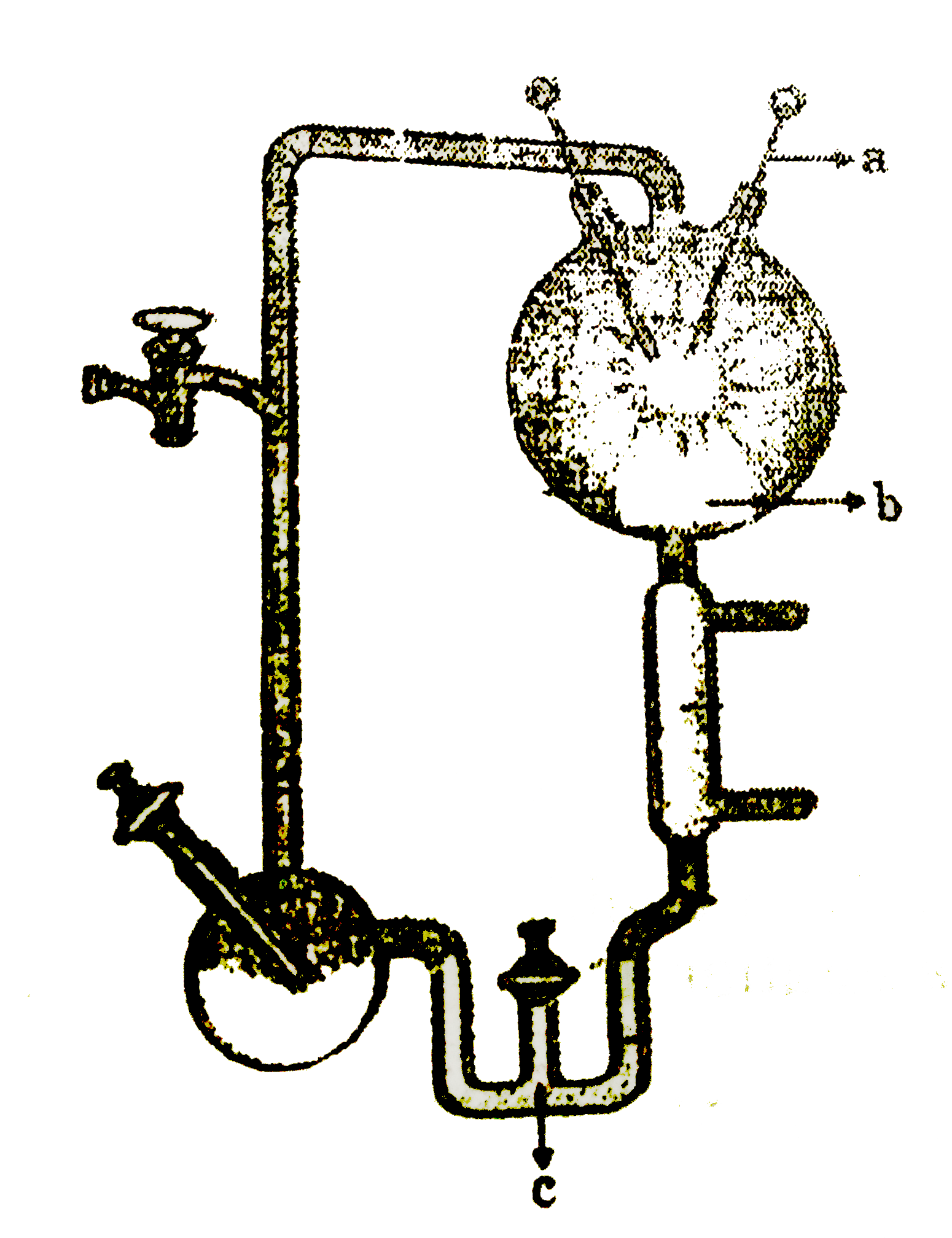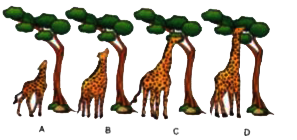i)Name the scientist who suggested that the genetic code should be made of a combination of three nucleotides.
ii) Explain the basis on which he arrived at this conclusion.
i) George Gamow suggested that the genetic code should be made up of a combination of three nucleotides.
ii) He proposed that If 20 amino acids are to be coded by 4 bases, then the code should be made up of three nucleotides. 43=64(42=16), which is less than 20. So, the codon was proposed to be triplet.
Similar Questions
Name the scientist who had used the set-up shown below. Write the purpose of 'a' in the set-up and the conclusion the scientist arrived at.
 View Solution
View SolutionCarefully observed the following figure

(a) Name the technique shown in the figure and the scientist who demonstrated this technique for the first time.
(b) Name atleast three plants for which this technique can be employed for their commercial production.
(c) What is the significance of aerating tube and feeding funnel in this setup ?View Solution
Knowledge Check
- Question 1 - Select One
Passage 1 is adapted from a speech given by Senator Robert Y. hayne in 1830. Passage 2 is adapted from a speech given in response by Sanator Daniel Webster on the following day.
Passage 1.
If I could, by a mere act of my will put at the disposal of the Federal Government any amount of treasur which I might think proper to name, I should limit the amount to the
means necessary for the legitimate purpose of Government. Sir, an immense national treasuring would be a fund for corruption. It would enable Congress and the Executive to exercise a control over States, as well as over great intersts in teh country, nay even over corporations and individuals-utterly destructive of the purity, and fatal to the duration of our institutions. It would be equally fatal to the sovereignty and independence of the States. Sir, I am one of those who believe that the very life of our system is the independence of teh States, and there is no evil more to be deprecated than the consolidation of this Government. It is only by a strict adherence to the limitations imp[osed by the constitution on the Federal Government, that this system works well, and can answer the great ends for which it was instituted. i am opposed, therefore, in any shape, to all unnecessary extension of the powers, or the influence of the Legislature of Exective of influence of the Legislature of Executive of the Union over the States, or the people of the States, and, most of all, I am opposed to those partial distibutions of favors, whether by legislation or appropriation, which has a direct and powerful tendency to spread corruption through the land, to create and abject spirit of dependence, to sow the seeds of dissolution, to produce jealousy among the different portions of teh Union, and finally to sap the very foundations of the Government itself.
Passage 2
As a reason for sishing to get rid of the public lands as soon as we could, and as we might, the honorable gentlmeman said, he wanted no permanent sources of income. He wished to see the time when the Government should not possess a shilling of permanent revenue. If he could speak a magical word, and by that word convert the whole capital into gold, the work should not be spoken. The administration of a fixed revenue, [he said] only consolidates the Government, and corrupts the people! Sir, I confess I heard these sentiments uttered on this floor with deep regret and pain.
I am aware that these, and similar opinions, are espoused by certain persons out of the capinions, are espoused by certain persons out of the capitol, and out of this Government, but I did non expect so soon to find them here. Consolidation!-that perpetual cry, both of terror and delusion- consolidation! Sir, when gentelmen speak of the effects of a common fund, belonging to all the States, as having a tendency to consolidation, what do they mesn? Do they mean, ior can they mean, anything more than that the Union of the States will be strenghened, by whatever continues or furnishes inducements to the people of the States to hold together? If they mean merely this, then, no doubt, the public lands as well as everyhing else in which we have a common interest, tends to consolidation, and to this idea of consolidation every true American ought to be attached, it is neiher more nor less than strengthening the Union itself. This is the sense in which the framers of teh constitution use the would consolidation, and in which sense I adopt and cherish i....
This,sir, is General Washington's consolidation. This is the ture constitutional consolidation. I wish to see no new powers drawn to the General Government, but I confess I rejoice in whatever tends to strengthen the bond that unites us, and encourages the hope that our Union may be perpetual. And, therefore, I cannot but feel regret at teh expression of such opinions as teh gentleman has ovowed, because I think their obvious tendency is to weaken the bond of our connection.
Which choice best characterizes how Webster responds to Hayne ?AHe challenges Hayne's understanding of economics.BHe cites historical examples to show that Hayne's predictions will not come true.CHe finds a neutral path between his position and Hayne's.DHe attempts to turn a key word that Hayne uses against him. - Question 2 - Select One
Passage 1 is adapted from a speech given by Senator Robert Y. hayne in 1830. Passage 2 is adapted from a speech given in response by Sanator Daniel Webster on the following day.
Passage 1.
If I could, by a mere act of my will put at the disposal of the Federal Government any amount of treasur which I might think proper to name, I should limit the amount to the
means necessary for the legitimate purpose of Government. Sir, an immense national treasuring would be a fund for corruption. It would enable Congress and the Executive to exercise a control over States, as well as over great intersts in teh country, nay even over corporations and individuals-utterly destructive of the purity, and fatal to the duration of our institutions. It would be equally fatal to the sovereignty and independence of the States. Sir, I am one of those who believe that the very life of our system is the independence of teh States, and there is no evil more to be deprecated than the consolidation of this Government. It is only by a strict adherence to the limitations imp[osed by the constitution on the Federal Government, that this system works well, and can answer the great ends for which it was instituted. i am opposed, therefore, in any shape, to all unnecessary extension of the powers, or the influence of the Legislature of Exective of influence of the Legislature of Executive of the Union over the States, or the people of the States, and, most of all, I am opposed to those partial distibutions of favors, whether by legislation or appropriation, which has a direct and powerful tendency to spread corruption through the land, to create and abject spirit of dependence, to sow the seeds of dissolution, to produce jealousy among the different portions of teh Union, and finally to sap the very foundations of the Government itself.
Passage 2
As a reason for sishing to get rid of the public lands as soon as we could, and as we might, the honorable gentlmeman said, he wanted no permanent sources of income. He wished to see the time when the Government should not possess a shilling of permanent revenue. If he could speak a magical word, and by that word convert the whole capital into gold, the work should not be spoken. The administration of a fixed revenue, [he said] only consolidates the Government, and corrupts the people! Sir, I confess I heard these sentiments uttered on this floor with deep regret and pain.
I am aware that these, and similar opinions, are espoused by certain persons out of the capinions, are espoused by certain persons out of the capitol, and out of this Government, but I did non expect so soon to find them here. Consolidation!-that perpetual cry, both of terror and delusion- consolidation! Sir, when gentelmen speak of the effects of a common fund, belonging to all the States, as having a tendency to consolidation, what do they mesn? Do they mean, ior can they mean, anything more than that the Union of the States will be strenghened, by whatever continues or furnishes inducements to the people of the States to hold together? If they mean merely this, then, no doubt, the public lands as well as everyhing else in which we have a common interest, tends to consolidation, and to this idea of consolidation every true American ought to be attached, it is neiher more nor less than strengthening the Union itself. This is the sense in which the framers of teh constitution use the would consolidation, and in which sense I adopt and cherish i....
This,sir, is General Washington's consolidation. This is the ture constitutional consolidation. I wish to see no new powers drawn to the General Government, but I confess I rejoice in whatever tends to strengthen the bond that unites us, and encourages the hope that our Union may be perpetual. And, therefore, I cannot but feel regret at teh expression of such opinions as teh gentleman has ovowed, because I think their obvious tendency is to weaken the bond of our connection.
On which of the following points do thte writers of the passages express agreement ?AThe Federal Government should not acquire new powers.BThe Constitution alone may not adequately address the current situation.CMoney can be corrupting influence.DThe Federal Government is spending more than it can afford. - Question 3 - Select One
Passage 1 is adapted from a speech given by Senator Robert Y. hayne in 1830. Passage 2 is adapted from a speech given in response by Sanator Daniel Webster on the following day.
Passage 1.
If I could, by a mere act of my will put at the disposal of the Federal Government any amount of treasur which I might think proper to name, I should limit the amount to the
means necessary for the legitimate purpose of Government. Sir, an immense national treasuring would be a fund for corruption. It would enable Congress and the Executive to exercise a control over States, as well as over great intersts in teh country, nay even over corporations and individuals-utterly destructive of the purity, and fatal to the duration of our institutions. It would be equally fatal to the sovereignty and independence of the States. Sir, I am one of those who believe that the very life of our system is the independence of teh States, and there is no evil more to be deprecated than the consolidation of this Government. It is only by a strict adherence to the limitations imp[osed by the constitution on the Federal Government, that this system works well, and can answer the great ends for which it was instituted. i am opposed, therefore, in any shape, to all unnecessary extension of the powers, or the influence of the Legislature of Exective of influence of the Legislature of Executive of the Union over the States, or the people of the States, and, most of all, I am opposed to those partial distibutions of favors, whether by legislation or appropriation, which has a direct and powerful tendency to spread corruption through the land, to create and abject spirit of dependence, to sow the seeds of dissolution, to produce jealousy among the different portions of teh Union, and finally to sap the very foundations of the Government itself.
Passage 2
As a reason for sishing to get rid of the public lands as soon as we could, and as we might, the honorable gentlmeman said, he wanted no permanent sources of income. He wished to see the time when the Government should not possess a shilling of permanent revenue. If he could speak a magical word, and by that word convert the whole capital into gold, the work should not be spoken. The administration of a fixed revenue, [he said] only consolidates the Government, and corrupts the people! Sir, I confess I heard these sentiments uttered on this floor with deep regret and pain.
I am aware that these, and similar opinions, are espoused by certain persons out of the capinions, are espoused by certain persons out of the capitol, and out of this Government, but I did non expect so soon to find them here. Consolidation!-that perpetual cry, both of terror and delusion- consolidation! Sir, when gentelmen speak of the effects of a common fund, belonging to all the States, as having a tendency to consolidation, what do they mesn? Do they mean, ior can they mean, anything more than that the Union of the States will be strenghened, by whatever continues or furnishes inducements to the people of the States to hold together? If they mean merely this, then, no doubt, the public lands as well as everyhing else in which we have a common interest, tends to consolidation, and to this idea of consolidation every true American ought to be attached, it is neiher more nor less than strengthening the Union itself. This is the sense in which the framers of teh constitution use the would consolidation, and in which sense I adopt and cherish i....
This,sir, is General Washington's consolidation. This is the ture constitutional consolidation. I wish to see no new powers drawn to the General Government, but I confess I rejoice in whatever tends to strengthen the bond that unites us, and encourages the hope that our Union may be perpetual. And, therefore, I cannot but feel regret at teh expression of such opinions as teh gentleman has ovowed, because I think their obvious tendency is to weaken the bond of our connection.
In passage 2, Webster most likely refers to General Washington in order toAmake a colorful analogy.Bemphasize the precedent for his position.Ccompare himself to Washington in order to seem more credible.Demphasize the honesty of his position.
Mrs, Rashmi Singh broke her readings glasses. When she went to shopkeeper to order new spects, he suggested that she should get spectacles with plastic lenses instead of galss lenses. On getting the new spectacles, she found that the new ones were thicker than the earlier ones. She asked this question to the shopkeeper but he could not offer satisfactory explanation for this. At home, Mrs. Singh raised the same question to her daughter Anuja who explained why plastic lenses were thicker.
(a) Write two qualities displayed each by Anuja and her mother .
(b) How do you explain this fact using lens maker's formula ?View SolutionName three animals who use ultrasonic waves. Explain atleast one animal which uses ultrasonic waves.
View SolutionAnswer the following questions based on Meselson and Stahl s experiment: (a) Write the name of the chemical substance used as a source of nitrogen in the experiment by them. (b) Why did the scientists synthesise the light and the heavy DNA molecules In the organism used in the experiment ? (c) How did the scientists make it possible to distinguish the heavy DNA molecule from the light DNA molecule ? Explain. ((1) Write the conclusion the scientists arrived at after completing the experiment.
View SolutionObserve the figures given below and then answer the questions that follow :

(i) What is the picture depicting ?
(ii) What was the reason that the giraffe stretched their neck and forelimbs ?
(iii) Name the theory to which this picture belongs.
(iv) Who explained this theory? (V) What is the conclusion of this theory?View Solution"A population has been exhibiting genetic equilibrium". Answer the following with regard to the above statement.
(i) Explain the above statement.
(ii) Name the underlying principle.
(iii) List any two factors which would upset the genetic equilibrium of the population.
(iv) Take up any one such factor and explain how the gene pool will change due to that factorView Solution

